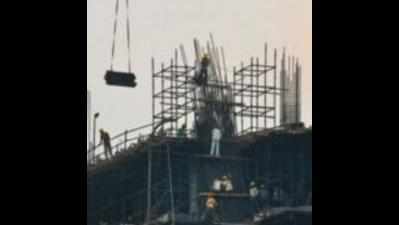- News
- City News
- mumbai News
- City lags in affordable hsg, needs good plans: Experts
Trending
This story is from April 17, 2016
City lags in affordable hsg, needs good plans: Experts
"Had affordable housing in distant suburbs been made available, decongestion of Mumbai would have been possible.

"Had affordable housing in distant suburbs been made available, decongestion of Mumbai would have been possible.
Mumbai: Maharashtra lags behind Gujarat in terms of supply of affordable housing while Mumbai city comes third after Ahmedabad and Indore with better housing stock for people from low-income groups, reveal expert panelists in their papers at the BRICS summit.
According to them, this shortage of housing had put a large burden of unorganized housing, slums, and demand for high FSI on the maximum city, which could put a heavy strain on existing infrastructure such as congestion on roads and demand for water.
"Had affordable housing in distant suburbs been made available, decongestion of Mumbai would have been possible. To reduce slums lowering property prices, increasing affordable housing stock for all categories and creating rental housing are the measures," experts such as B C Khatua have suggested.
A report on the state of low-income housing market by Monitor Deloitte highlighted that 78,000 houses costing below Rs 10 lakh were sold in urban india, of which 31,000 were built between 2011 and 2013 in over 130 projects in 22 cities by the private builders without any significant assistance from government. This, according to experts such as Vikram Jain, Aditya Agarwal and Ashish Karamchandani of FSG Inclusive Markets, was far short of the millions of homes required by low-income group citizens in the country. Mumbai First, an NGO has come up with a compilation of papers The Making of the Vibrant Cities by the experts.
When it comes to redevelopment, says Abbas Master, Bhendi Bazaar redeveloment was stuck due to no-acquisition of properties, time-consuming government approvals and the legal hurdles created by non-consenting landowners and tenants. "Otherwise cluster development can facilitate wider roads, more open space and ample parking and cleaner neighbourhood. It can give makeover to the city to achieve holistic, sustainable safer cities. Dealing with various departments and numerous multi-level approvals cause significant delay," says Master.
According to them, this shortage of housing had put a large burden of unorganized housing, slums, and demand for high FSI on the maximum city, which could put a heavy strain on existing infrastructure such as congestion on roads and demand for water.
"Had affordable housing in distant suburbs been made available, decongestion of Mumbai would have been possible. To reduce slums lowering property prices, increasing affordable housing stock for all categories and creating rental housing are the measures," experts such as B C Khatua have suggested.
A report on the state of low-income housing market by Monitor Deloitte highlighted that 78,000 houses costing below Rs 10 lakh were sold in urban india, of which 31,000 were built between 2011 and 2013 in over 130 projects in 22 cities by the private builders without any significant assistance from government. This, according to experts such as Vikram Jain, Aditya Agarwal and Ashish Karamchandani of FSG Inclusive Markets, was far short of the millions of homes required by low-income group citizens in the country. Mumbai First, an NGO has come up with a compilation of papers The Making of the Vibrant Cities by the experts.
According to the FSG trio, fast and time-bound approvals for low-cost housing, developing infrastructure such as roads, classifying debt to housing finance companies that is lent to low-income customers as priority sector lending, and waiving stamp duty and registration for end-customers should be some of the steps to encourage affordable housing stock. "Mandating a fixed percentage of every project for EWS and LIG housing, incentivizing developers by offering additional FSI, providing viability of gap funding, ensuring competitive bidding and offering surplus government land in exchange for bid of higher number of low-income housing should be the initiatives," they added.
When it comes to redevelopment, says Abbas Master, Bhendi Bazaar redeveloment was stuck due to no-acquisition of properties, time-consuming government approvals and the legal hurdles created by non-consenting landowners and tenants. "Otherwise cluster development can facilitate wider roads, more open space and ample parking and cleaner neighbourhood. It can give makeover to the city to achieve holistic, sustainable safer cities. Dealing with various departments and numerous multi-level approvals cause significant delay," says Master.
End of Article
FOLLOW US ON SOCIAL MEDIA











